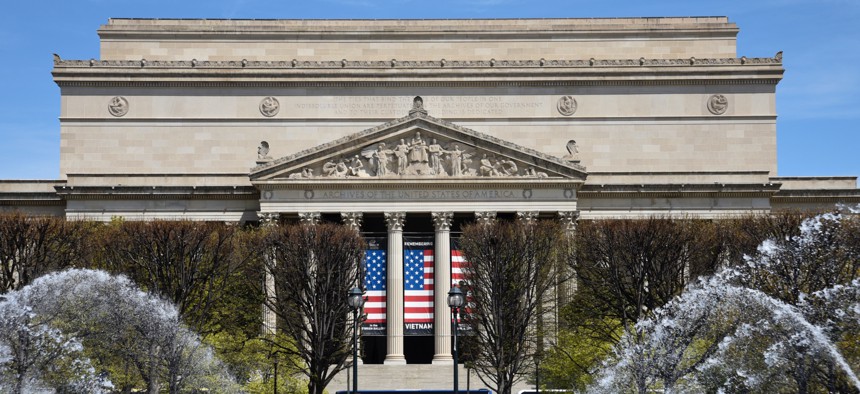
NARA officials said Wednesday that they had eliminated a backlog of pending veterans records requests that amassed during the pandemic. Robert Alexander / Getty Images
Archives clear pandemic-era backlog of veterans records requests
A combination of increased staffing and work hours, along with technological advances, allowed the National Personnel Records Center to dig out of backlog of more than 600,000 overdue records requests that accumulated due to the COVID-19 pandemic.
Officials at the National Archives and Records Administration announced Wednesday that the agency has eliminated the backlog of pending veterans records requests that had built up over the course of the COVID-19 pandemic.
During the pandemic, NARA’s National Personnel Record Center, based in St. Louis, racked up a backlog of more than 600,000 overdue records requests, due to social distancing guidelines and restrictions on how many employees could be on-site at once in an effort to stem the spread of the virus.
At her confirmation hearing last February, the then-nominee to serve as the federal government’s chief archivist, Colleen Shogan, vowed to eradicate the backlog, describing the issue as “of utmost importance” to her. The fiscal 2023 National Defense Authorization Act set a December 2023 deadline to eliminate the logjam.
NARA officials said Wednesday that the agency made a number of changes to increase its capacity to process veterans’ records requests, including technological improvements, increased staffers and contractors to longer work hours. The NPRC also entered into a series of agreements with the Veterans Affairs Department to accelerate the digitization of records.
“The National Archives plays a critical role in ensuring that our veterans and their families have access to the records they need for the benefits they’ve earned,” Shogan said. “Clearing the backlog of record requests at the National Personnel Records Center has been my top priority and I am proud that we have gotten this done. I want to recognize the hard work and dedication of the National Archives staff. They have worked overtime and across weekends and holidays to achieve this goal and ensure we meet our obligation to those who’ve served.”
NPRC Director Scott Levins said that the improvements made to address the backlog leave the agency well-equipped to both improve processing times on a permanent basis and to meet future challenges. With the backlog out of the way, the agency expects to respond to “most routine” records requests within a week and fulfill more complex requests within 20 days. The agency typically receives more than 4,000 new requests per day.
“I have worked for the National Archives for 35 years and the pandemic and subsequent backlog presented the greatest challenges of my career, but they also led to many fast-paced, transformative changes, particularly with regard to transitioning NPRC’s holdings and processes to an electronic environment,” Levins said. “We are routinely doing things today that were seemingly impossible before the pandemic and which position us for success for years to come.”
In a statement, Sen. Mike Rounds, R-S.D., who sponsored the provision of the fiscal 2023 NDAA, setting the December deadline and authorizing additional funding for the agency, applauded Wednesday’s announcement.
“Our men and women in uniform have sacrificed so much to protect our freedom,” he said. “While the NPRC’s backlog was unacceptable, I am pleased it has been remediated so veterans can acquire their records in a timely manner. I will continue to work with my colleagues on both sides of the aisle to make certain our veterans have access to the services and benefits they have earned.”







